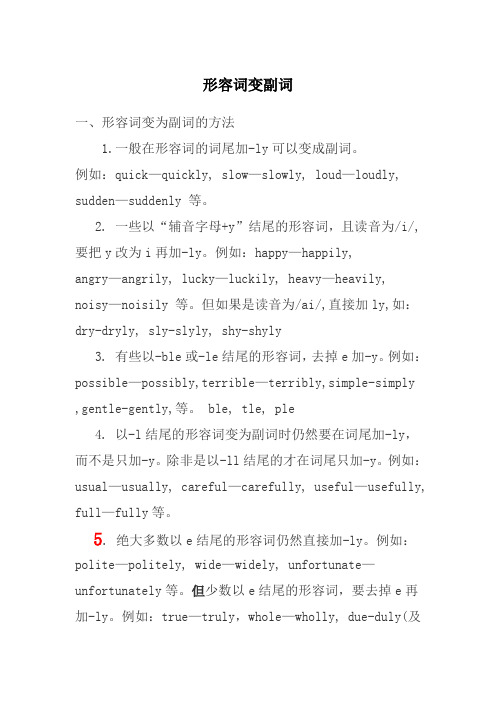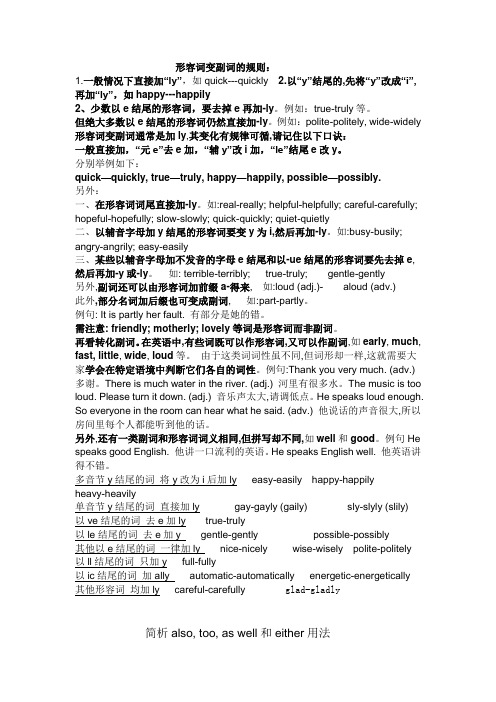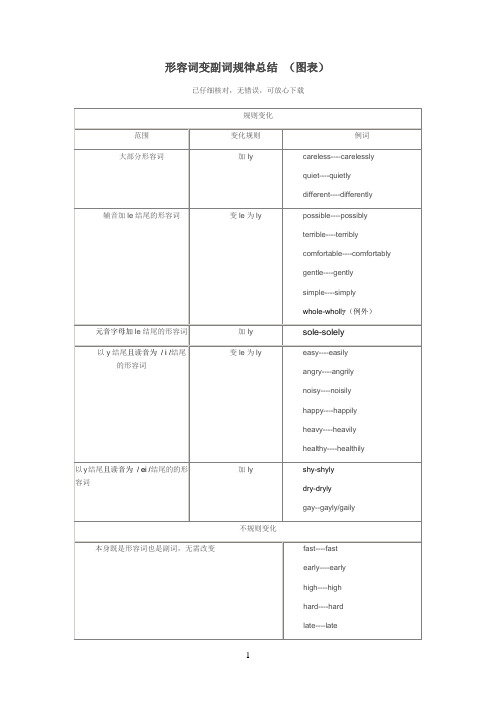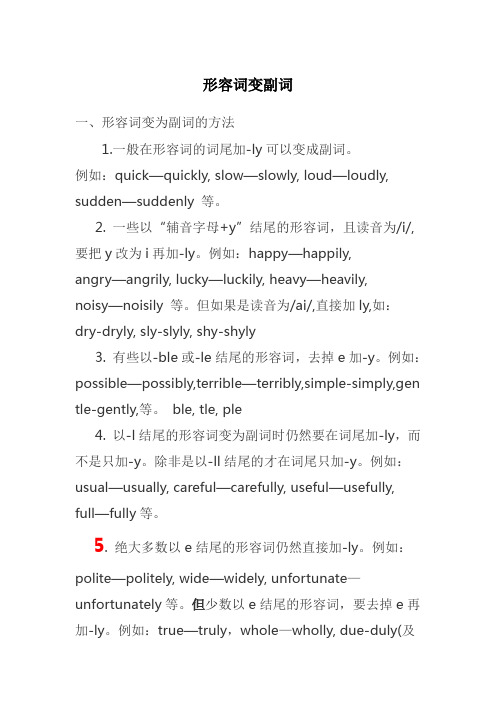形容词转换为副词的规律
形容词变副词规律

形容词变副词通常是加ly,其变化有规律可循,请记住以下口诀:一般直接加,“元e”去e加ly,“辅y”改i加,“le”结尾e改y。
分别举例如下:quick-quickly; true-truly;happy-happily; possibl e-possibl y具体规则如下:1.一般情况下直接加“ly”,如:quick-quickly;polite-politel y;sad-sadly;immedia te-immedia tely;recent-recentl y2.少数以元音字母加e结尾的形容词,要去掉e再加-ly。
如:true-truly; due-duly绝大多数辅音字母加e结尾的形容词直接加-ly。
如:polite-politel y;wide-widely;wise-wisely; nice-nicely3.以“y”结尾的,且读音为/ i /,先将“y”改成“i”,再加“ly”,如:happy-happily;heavy-heavily;angry-angrily;busy-busily但是如果读音为/ ai /,直接加ly,如:dry-dryly; sly-slyly;shy---shyly4.以ic结尾的词,加ally,如:economi c-economi cally;basic-basical ly;scienti fic-scienti ficall y;automat ic-automat ically; energet ic-energet ically; 但是publi c-publicl y例外。
5.以辅音字母加l e结尾时,去e加y,如:simple-simply;conside rable-conside rably;terribl e-terribl y comfort ablygentle-gently;possibl e-possibl y;probabl e-probabl y; incredi ble-incredi bly元音字母加le时加ly,如:sole-solely。
形容词变副词的方法

形容词变副词的方法释疑形容词变副词时有什么规律??有没有形容词副词同形的?如fast 即做adj.(形容词) 又做adv.(副词)。
答:形容词变为副词的方法一般在形容词的词尾加-ly可以变成副词。
例如:quick—quickly, slow—slowly, loud—loudly, sudden—suddenly 等。
但是,以下几点值得注意:1. 一些以“辅音字母+y”结尾的形容词,要把y改为i再加-ly. 例如:happy—happily, angry—angrily, lucky—luckily, heavy—heavily, noisy—noisily 等。
2.有些以-ble或-le结尾的形容词,去掉e加-y. 例如:possible—possibly, terrible—terribly等。
3. 少数以e结尾的形容词,要去掉e再加-ly. 例如:true—truly等。
但绝大多数以e结尾的形容词仍然直接加-ly. 例如:polite—politely, wide—widely,nice--nice ly等。
4. 以-l结尾的形容词变为副词时仍然要在词尾加-ly,除非是以-ll结尾的才在词尾只加-y.例如:usual—usually, careful—carefully, useful—usefully, full—full y等。
同形的副词和形容词fast train 快车hard workers 干活卖力的工人run fast 跑得快work hard 干活卖力,工作努力right answer 正确的回答enough food 足够的食物do everything right 样样事情做得对large enough 足够大in the late afternoon 傍晚in the early morning 一大早work late 工作得晚come early 来得早其他如straight, wide, high, low也都能用作形容词和副词。
形容词变副词规律和特殊情况

一、形容词变副词规律及特殊情况1.一般直接加lycareless-carelesslyconfident-confidentlyfortunate-fortunately2.以le结尾的形容词去e加yterrible-terriblypossible-possiblycomfortable-comfortablygentle-gently3.其他以e结尾的形容词直接加lywise-wiselynice-nicelyentire-entirelyabsolute-absolutely4.以辅音字母+y结尾的,变y为i+lyhappy-happilyeasy-easilyangry-angrilymerry-merrily5.以ic结尾的+allyspecific-specificallybasic-basicallyscientific-scientifically6.adj和adv同形fast-fastearly-earlyhard-hardlate-latefar-faralone-alonelittle-little7.有两个副词形式的词high-high/highlydeep-deep/deeplyhard-hard/hardlyclose-close/closelywide-wide/widelyloud-loud/loudlylate-late/lately有无ly意义大不相同的副词:⎩⎨⎧dead 完全,绝对 be dead asleep deadly 非常 be deadly tired ⎩⎨⎧pretty 相当 be pretty certain that...prettily 漂亮地 be prettily dressed⎩⎨⎧close 近 Don't sit close.closely 密切地 Watch closely ! ⎩⎨⎧late 晚,迟 arrive late lately 最近 I haven't seen him lately. ⎩⎨⎧hard 努力地 I study hard.hardly 几乎不 I could hardly recognize her. 8. 特殊true -trulywhole -whollyfull -fullydull -dullypublic -publiclyshy →shyly9. 以ly 结尾的adj.friendly lovely lonely sillydeadly lively(生动的,活泼点)manly womanly elderlybrotherly fatherly motherlydaily weekly monthly yearly二、副词的句法功能修饰动词→He studies hard.修饰形容词→He is very smart.修饰副词→He does very well in English.修饰句子→Obviously, your answer is absolutely wrong.(频率副词常放在be动词、助动词、情态动词之后,行为动词之前I have never seen him before. He usually reads books.)三、构成形容词的常见后缀1.名词+ysun- sunnyfun- funnyrain- rainyflower- flowery(花香的)2.动词+ableadvise- advisable(可取的,明智的)comfort- comfortable3.名词+alnation- nationaleducation- educationalnature- natural(天然的)4.名词+enwood- wooden(木制的)gold- golden(金色的)5.动词+entdiffer- differentinsist- insistent(坚持的)6.名词+ishfool- foolishself- selfishchild- childish(孩子气的的)7.动词+iveact- activeimpress- impressive8.名词+fulpower- powerfulpeace- peacefulbeauty- beautifulwonder- wonderful9.名词+ousdanger- dangerouscourage- courageous(勇敢的)fame- famousenvy- envious(羡慕的,嫉妒的)10.名词+lyfriend- friendlytime- timely(及时的)order- orderly(有秩序的)day- daily(每天的)week-weeklymonth-monthlyyear-yearly四、形容词和副词变比较级和最高级规则1.一般+er/eststrong- stronger- strongest2.以字母e结尾只加r/stlate- later- latest以一个辅音字母结尾的重读闭音节词,双写这一个辅音字母后再加er/est 闭音节:a)辅音+元音+辅音例如:bad,bed,sit,hot,cup;b)元音+辅音例如it、of; c) 元音+多个辅音例如:egg ,fish 。
形容词变副词

形容词变副词一、形容词变为副词的方法1.一般在形容词的词尾加-ly可以变成副词。
例如:quick—quickly, slow—slowly, loud—loudly, sudden—suddenly 等。
2. 一些以“辅音字母+y”结尾的形容词,且读音为/i/,要把y改为i再加-ly。
例如:happy—happily, angry—angrily, lucky—luckily, heavy—heavily, noisy—noisily 等。
但如果是读音为/ai/,直接加ly,如:dry-dryly, sly-slyly, shy-shyly3. 有些以-ble或-le结尾的形容词,去掉e加-y。
例如:possible—possibly,terrible—terribly,simple-simply,gentle-gently,等。
ble, tle, ple4. 以-l结尾的形容词变为副词时仍然要在词尾加-ly,而不是只加-y。
除非是以-ll结尾的才在词尾只加-y。
例如:usual—usually, careful—carefully, useful—usefully, full—fully等。
5. 绝大多数以e结尾的形容词仍然直接加-ly。
例如:polite—politely, wide—widely, unfortunate—unfortunately等。
但少数以e结尾的形容词,要去掉e再加-ly。
例如:true—truly,whole—wholly, due-duly(及时)等。
6.以ic结尾的加allyEnergetic-energeticallyAutomatic-automaticallyScientific-scientificallyEconomic-economicallyBasic-basically Public-publicly(例外)注意:1.不是所有的以-ly结尾的词都是副词。
形容词变副词的规则

形容词变副词的规则:1.一般情况下直接加“ly”,如quick---quickly2.以“y”结尾的,先将“y”改成“i”,再加“ly”,如happy---happily2、少数以e结尾的形容词,要去掉e再加-ly。
例如:true-truly等。
但绝大多数以e结尾的形容词仍然直接加-ly。
例如:polite-politely, wide-widely 形容词变副词通常是加ly,其变化有规律可循,请记住以下口诀:一般直接加,“元e”去e加,“辅y”改i加,“le”结尾e改y。
分别举例如下:quick—quickly, true—truly, happy—happily, possible—possibly.另外:一、在形容词词尾直接加-ly。
如:real-really; helpful-helpfully; careful-carefully; hopeful-hopefully; slow-slowly; quick-quickly; quiet-quietly二、以辅音字母加y结尾的形容词要变y为i,然后再加-ly。
如:busy-busily; angry-angrily; easy-easily三、某些以辅音字母加不发音的字母e结尾和以-ue结尾的形容词要先去掉e,然后再加-y或-ly。
如: terrible-terribly; true-truly; gentle-gently另外,副词还可以由形容词加前缀a-得来, 如:loud (adj.)- aloud (adv.)此外,部分名词加后缀也可变成副词, 如:part-partly。
例句: It is partly her fault. 有部分是她的错。
需注意: friendly; motherly; lovely等词是形容词而非副词。
再看转化副词。
在英语中,有些词既可以作形容词,又可以作副词,如early, much, fast, little, wide, loud等。
形容词变副词

形容词变副词一、形容词变为副词的方法1.一般在形容词的词尾加-ly可以变成副词。
例如:quick—quickly, slow—slowly, loud—loudly, sudden—suddenly 等。
2. 一些以“辅音字母+y”结尾的形容词,且读音为/i/,要把y改为i再加-ly。
例如:happy—happily, angry—angrily, lucky—luckily, heavy—heavily, noisy—noisily 等。
但如果是读音为/ai/,直接加ly,如:dry-dryly, sly-slyly, shy-shyly3. 有些以-ble或-le结尾的形容词,去掉e加-y。
例如:possible—possibly,terrible—terribly,simple-simply,gentle-gently,等。
ble, tle, ple4. 以-l结尾的形容词变为副词时仍然要在词尾加-ly,而不是只加-y。
除非是以-ll结尾的才在词尾只加-y。
例如:usual—usually, careful—carefully, useful—usefully, full—fully等。
5. 绝大多数以e结尾的形容词仍然直接加-ly。
例如:polite—politely, wide—widely, unfortunate—unfortunately等。
但少数以e结尾的形容词,要去掉e再加-ly。
例如:true—truly,whole—wholly, due-duly(及时)等。
6.以ic结尾的加allyEnergetic-energetically Automatic-automaticallyScientific-scientifically Economic-economicallyBasic-basically Public-publicly(例外)注意:1.不是所有的以-ly结尾的词都是副词。
形容词变副词规律及特殊情况

一、形容词变副词规律及特殊情况1.一般直接加lycareless-carelesslyconfident-confidentlyfortunate-fortunately2.以le结尾的形容词去e加yterrible-terriblypossible-possiblycomfortable-comfortablygentle-gently3.其他以e结尾的形容词直接加lywise-wiselynice-nicelyentire-entirelyabsolute-absolutely4.以辅音字母+y结尾的,变y为i+lyhappy-happilyeasy-easilyangry-angrilymerry-merrily5.以ic结尾的+allyspecific-specificallybasic-basicallyscientific-scientifically6.adj和adv同形fast-fastearly-earlyhard-hardlate-latefar-faralone-alonelittle-little7.有两个副词形式的词high-high/highlydeep-deep/deeplyhard-hard/hardlyclose-close/closelywide-wide/widelyloud-loud/loudlylate-late/lately有无ly意义大不相同的副词:⎩⎨⎧dead 完全,绝对 be dead asleep deadly 非常 be deadly tired ⎩⎨⎧pretty 相当 be pretty certain that...prettily 漂亮地 be prettily dressed⎩⎨⎧close 近 Don't sit close.closely 密切地 Watch closely ! ⎩⎨⎧late 晚,迟 arrive late lately 最近 I haven't seen him lately. ⎩⎨⎧hard 努力地 I study hard.hardly 几乎不 I could hardly recognize her. 8. 特殊true -trulywhole -whollyfull -fullydull -dullypublic -publiclyshy →shyly9. 以ly 结尾的adj.friendly lovely lonely sillydeadly lively(生动的,活泼点)manly womanly elderlybrotherly fatherly motherlydaily weekly monthly yearly二、副词的句法功能修饰动词→He studies hard.修饰形容词→He is very smart.修饰副词→He does very well in English.修饰句子→Obviously, your answer is absolutely wrong.(频率副词常放在be动词、助动词、情态动词之后,行为动词之前I have never seen him before. He usually reads books.)三、构成形容词的常见后缀1.名词+ysun- sunnyfun- funnyrain- rainyflower- flowery(花香的)2.动词+ableadvise- advisable(可取的,明智的)comfort- comfortable3.名词+alnation- nationaleducation- educationalnature- natural(天然的)4.名词+enwood- wooden(木制的)gold- golden(金色的)5.动词+entdiffer- differentinsist- insistent(坚持的)6.名词+ishfool- foolishself- selfishchild- childish(孩子气的的)7.动词+iveact- activeimpress- impressive8.名词+fulpower- powerfulpeace- peacefulbeauty- beautifulwonder- wonderful9.名词+ousdanger- dangerouscourage- courageous(勇敢的)fame- famousenvy- envious(羡慕的,嫉妒的)10.名词+lyfriend- friendlytime- timely(及时的)order- orderly(有秩序的)day- daily(每天的)week-weeklymonth-monthlyyear-yearly四、形容词和副词变比较级和最高级规则1.一般+er/eststrong- stronger- strongest2.以字母e结尾只加r/stlate- later- latest以一个辅音字母结尾的重读闭音节词,双写这一个辅音字母后再加er/est 闭音节:a)辅音+元音+辅音例如:bad,bed,sit,hot,cup;b)元音+辅音例如it、of; c) 元音+多个辅音例如:egg ,fish 。
形容词变副词的规则

形容词变副词的规则:1.一般情况下直接加“ly”,如quick---quickly2.以“y”结尾的,先将“y”改成“i”,再加“ly”,如happy---happily2、少数以e结尾的形容词,要去掉e再加-ly。
例如:true-truly等。
但绝大多数以e结尾的形容词仍然直接加-ly。
例如:polite-politely, wide-widely 形容词变副词通常是加ly,其变化有规律可循,请记住以下口诀:一般直接加,“元e”去e加,“辅y”改i加,“le”结尾e改y。
分别举例如下:quick—quickly, true—truly, happy—happily, possible—possibly.另外:一、在形容词词尾直接加-ly。
如:real-really; helpful-helpfully; careful-carefully; hopeful-hopefully; slow-slowly; quick-quickly; quiet-quietly二、以辅音字母加y结尾的形容词要变y为i,然后再加-ly。
如:busy-busily; angry-angrily; easy-easily三、某些以辅音字母加不发音的字母e结尾和以-ue结尾的形容词要先去掉e,然后再加-y或-ly。
如: terrible-terribly; true-truly; gentle-gently另外,副词还可以由形容词加前缀a-得来, 如:loud (adj.)- aloud (adv.)此外,部分名词加后缀也可变成副词, 如:part-partly。
例句: It is partly her fault. 有部分是她的错。
需注意: friendly; motherly; lovely等词是形容词而非副词。
再看转化副词。
在英语中,有些词既可以作形容词,又可以作副词,如early, much, fast, little, wide, loud等。
形容词变副词规律总结 (图表)

形容词变副词规律总结(图表)已仔细核对,无错误,可放心下载1. Mrs White smiled _____ ( happy) when she received a present from her daughter.2. Why do you think you did so ___________(terribe)in your test?3. We can __________(easy) forgive a child who is afraid of the dark, but we can’t forgivean adult who is afraid of the light.4. Congratulations! Y ou’ve answered all the questions _________(correct).5. The computer is ______( wide)used in our daily life. We can do many things with it.6. I changed into my sports shoes so that I could walk more ____________(comfortabe).7. Mary passed her examination because she studied very ________( hard ).8. “Why didn’t you tell me earlier?” The boss shouted _______(angry).9. It’s ___(true) possible that robot teachers will be popular in schools some day.10. How _________(comfortable) the giant pandas are living in Taiwan!11. Miss Xu smiled and said to me ________(soft), “Never mind, my boy!”12. Last night it rained __________(heavy) in the southern part of the city.13. Simon hates to be like others, he often tires to do everything ______(different).14. ----Where is Peter from? ----He is French, if I remember _________(correct).15. The children clapped their hands _________(excited) as soon as the astronauts appeared on the stage.16. Tom had an accident yesterday. His teacher sent him to the hospital ____(quick).17. We should speak to the old man _________(polite)18. I’m _______(true) sorry I can’t go with you. I have a lot to do this afternoon.19. Nancy is patient and she doesn’t give up ________(easy).20.His father was looking _____ (angry) at him because he had made a serious mistake.21.Mike walked _______(quiet) into the room not to wake up his grandpa.22. How _______(quick) Betty answered the teacher’s question!23. The firemen have saved the boy from the fire ____________(successful).Keys: 1. happily 2.terribly 3. easily 4. correctly 5. widely 6. comfortably7. hard 8. angrily 9. truly 10. comfortably 11. softly 12. heavily 13. differently14. correctly 15. excitedly 16. quickly 17. politely 18. truly 19. easily 20. angrily 21. quietly 22. quickly 23. successfully。
形容词变副词

形容词变副词一、形容词变为副词的方法1.一般在形容词的词尾加-ly可以变成副词。
例如:quick—quickly, slow—slowly, loud—loudly, sudden—suddenly 等。
2. 一些以“辅音字母+y”结尾的形容词,且读音为/i/,要把y改为i再加-ly。
例如:happy—happily, angry—angrily, lucky—luckily, heavy—heavily, noisy—noisily 等。
但如果是读音为/ai/,直接加ly,如:dry-dryly, sly-slyly, shy-shyly3. 有些以-ble或-le结尾的形容词,去掉e加-y。
例如:possible—possibly,terrible—terribly,simple-simply,gentle-gently,等。
ble, tle, ple4. 以-l结尾的形容词变为副词时仍然要在词尾加-ly,而不是只加-y。
除非是以-ll结尾的才在词尾只加-y。
例如:usual—usually, careful—carefully, useful—usefully, full—fully等。
5. 绝大多数以e结尾的形容词仍然直接加-ly。
例如:polite—politely, wide—widely, unfortunate—unfortunately等。
但少数以e结尾的形容词,要去掉e再加-ly。
例如:true—truly,whole—wholly, due-duly(及时)等。
6.以ic结尾的加allyEnergetic-energeticallyAutomatic-automaticallyScientific-scientificallyEconomic-economicallyBasic-basically Public-publicly(例外)注意:1.不是所有的以-ly结尾的词都是副词。
初中英语词性转换规律总结附学习方法

初中英语词性转换规律总结附学习方法词性转换是英语学习中的重要内容之一,主要是指名词、动词、形容词和副词之间的转换。
以下是初中英语词性转换的常见规律总结:1.名词转动词:可以通过加上动词的前缀或后缀来转换。
- 加前缀:表示开始、做其中一种动作或进行其中一种活动。
例如:end(名词)→extend(动词)- 加后缀:表示把事物加上或变成其中一种状态。
例如:hope(名词)→hopeful(形容词)、lesson(名词)→ lessen(动词)2.动词转名词:可以通过加上名词的后缀来转换。
- 加后缀:表示其中一种行为、状态或事物。
例如:enjoy(动词)→ enjoyment(名词)、read(动词)→ reader(名词)3. 形容词转副词:通常在形容词后加上-ly。
- 加后缀:表示程度或方式。
例如:quick(形容词)→ quickly(副词)、careful(形容词)→ carefully(副词)4. 副词转形容词:在副词前加上very或更高级形容词。
- 加修饰词:表示强调程度。
例如:soon(副词)→very soon(形容词)、good(副词)→better(形容词)学习方法:1.多读多写:通过阅读和写作,积累词汇并学会词性之间的转换。
2.制作词性转换表格:将常见的词性转换规律整理成表格,方便记忆和查找。
3.多做练习:完成词性转换的练习题,提高应用能力。
4.注意词义变化:在词性转换过程中,要注意词义的变化,确保转换后的词语在上下文中使用正确。
总之,词性转换是一个积累和灵活运用的过程,需要多做练习,多积累常见的词性转换规律,以提高自己的语言运用能力。
形容词变副词的规则口诀

形容词变副词的规则口诀形容词变副词:形容词变副词有规律,后缀ly加上去;e结尾,要注意,前为元音要去e;要是结尾le,前为元音也去e,前为辅音e变y;y结尾不读[ai],先把y变成i;ic结尾加ally,public要除开。
一、形容词变副词的规则形容词变副词有规律,后缀ly加上去。
例如:一般情况下直接加“ly”,如:quick-quickly;polite-politely;sad-sadly;imediate-immediately;recent-recentlye结尾,要注意,前为元音要去e。
少数以e结尾的形容词,要去掉e再加-ly。
如:true-truly;due-duly绝大多数辅音字母加e结尾的形容词直接加-ly。
如:polite-politely;wide-widely;wise-wisely;nice-nicely以“y”结尾的,且读音为/i/,先将“y”改成“i”,再加“ly”,如:happy-happily;heavy-heavily;angry-angrily;busy-busily但是如果读音为/ai/,直接加ly,如:dry-dryly;sly-slyly;shy---shyly以ic结尾的词,加ally,如:economic-economically;basic-basically;scientific-scientifically;automatic-automatically;en ergetic-energetically;但是public-publicly例外。
二、形容词的定义形容词是说明人或事物的属性、状态或特征的词,在句子中主要作名词的装饰语。
形容词通常置于其修饰的名词之前,并且多数形容词具有比较等级。
描述形容词表示名词的性质、颜色、大小和状态等的形容词。
如:He bought some new books. 他买了一些新书。
These books are new. 这些书是新的。
形容词变副词

形容词变副词一、形容词变为副词的方法1.一般在形容词的词尾加-ly可以变成副词。
例如:quick—quickly, slow—slowly, loud—loudly, sudden—suddenly 等。
2. 一些以“辅音字母+y”结尾的形容词,且读音为/i/,要把y改为i再加-ly。
例如:happy—happily, angry—angrily, lucky—luckily, heavy—heavily, noisy—noisily 等。
但如果是读音为/ai/,直接加ly,如:dry-dryly, sly-slyly, shy-shyly3. 有些以-ble或-le结尾的形容词,去掉e加-y。
例如:possible—possibly,terrible—terribly,simple-simply,gen tle-gently,等。
ble, tle, ple4. 以-l结尾的形容词变为副词时仍然要在词尾加-ly,而不是只加-y。
除非是以-ll结尾的才在词尾只加-y。
例如:usual—usually, careful—carefully, useful—usefully, full—fully等。
5. 绝大多数以e结尾的形容词仍然直接加-ly。
例如:polite—politely, wide—widely, unfortunate—unfortunately等。
但少数以e结尾的形容词,要去掉e再加-ly。
例如:true—truly,whole—wholly, due-duly(及时)等。
6.以ic结尾的加allyEnergetic-energeticallyAutomatic-automatically Scientific-scientificallyEconomic-economicallyBasic-basically Public-publicly(例外) 注意:1.不是所有的以-ly结尾的词都是副词。
形容词变副词规律和特殊情况

一、形容词变副词规律及特殊情况1. 一般直接加lycareless-carelesslyconfident-confidentlyfortunate-fortunately2.以le结尾的形容词去e加yterrible-terriblypossible-possiblycomfortable-comfortablygentle-gently3.其他以e结尾的形容词直接加lywise-wiselynice-nicelyentire-entirelyabsolute-absolutely4.以辅音字母+y结尾的,变y为i+lyhappy-happilyeasy-easilyangry-angrilymerry-merrily5.以ic结尾的+allyspecific-specificallybasic-basicallyscientific-scientifically6. adj和adv同形fast-fastearly-earlyhard-hardlate-latefar-faralone-alonelittle-little7. 有两个副词形式的词high-high/highlydeep-deep/deeplyhard-hard/hardlyclose-close/closelywide-wide/widelyloud-loud/loudlylate-late/lately有无ly意义大不相同的副词:[dead 完全,绝对be dead asleep£©髓~卜非常be deadly tired[pretty相当be pretty certain that...卜”面1丫漂亮地be prettily dressed'close近Don't sit close.<,closely密切地Watch closely!'late 晚,迟arrive late< _Jately最近I haven't seen him lately.'hard 努力地I study hard.< 一一一 ,hardly 几乎不I could hardly recognize her.8. 特殊true-trulywhole-whollyfull-fullydull-dullypublic-publiclyshy f shyly9.以ly结尾的adj. friendly lovely lonely sillydeadly lively(生动的,活泼点)manly womanly elderlybrotherly fatherly motherly daily weekly monthly yearly 二、副词的句法功能修饰动词f He studies hard.修饰形容词f He is very smart.修饰副词f He does very well in English.修饰句子f Obviously, your answer is absolutely wrong.(频率副词常放在be动词、助动词、情态动词之后,行为动词之前I have neverseen him before. He usually reads books.)三、构成形容词的常见后缀1.名词+ysun- sunnyfun- funnyrain- rainyflower- flowery (花香的)2.动词+ableadvise- advisable (可取的,明智的)comfort- comfortable3.名词+alnation- nationaleducation- educationalnature- natural (天然的)4.名词+enwood- wooden (木制的)gold- golden (金色的)5.动词+entdiffer- differentinsist- insistent (坚持的)6.名词+ishfool- foolishself- selfishchild- childish (孩子气的的)7.动词+iveact- activeimpress- impressive8.名词+fulpower- powerfulpeace- peacefulbeauty- beautifulwonder- wonderful9.名词+ousdanger- dangerouscourage- courageous (勇敢的)fame- famousenvy- envious (羡慕的,嫉妒的)10.名词+lyfriend- friendlytime- timely (及时的)order- orderly (有秩序的)day- daily (每天的)week-weeklymonth-monthlyyear-yearly四、形容词和副词变比较级和最高级规则1. 一般+er/eststrong- stronger- strongest2.以字母e结尾只加r/stlate- later- latest以一个辅音字母结尾的重读闭音节词,双写这一个辅音字母后再加er/est 闭音节:a)辅音+元音+辅音例如:bad,bed,sit,hot,cup;8元音+辅音例如it、of; c)元音十多个辅音例如:egg,fish。
英语中形容词变副词的方法

英语中形容词变副词的方法
在英语中,一般有两种方法可以将形容词变为副词:
1. 添加 -ly 后缀:将形容词的词尾 -y 改为 -i 再加上 -ly,例如:
- quick (快速的)→ quickly(快速地)
- happy(快乐的)→ happily(快乐地)
- careful(小心的)→ carefully(小心地)
- beautiful(美丽的)→ beautifully(美丽地)
2.无规律变化:一些形容词变为副词时没有明确的规律可言,需要通
过熟悉和记忆,例如:
- hard(努力的)→ hard(努力地)
- fast(快速的)→ fast(快速地)
- late(晚的)→ late(晚地)
- early(早的)→ early(早地)
需要注意的是,并不是所有形容词都可以直接转化为副词,有些形容
词是不可数的或特殊的,不能直接加 -ly 后缀。
此外,还有一部分形容
词和副词形式相同,无需变化,例如:easy(简单的/容易地)、fine
(好的/好地)、high(高的/高地)。
形容词变副词

形容词变副词一、形容词变为副词的方法1.一般在形容词的词尾加-ly可以变成副词。
例女口: quick 一quickly, slow—slowly, loud一loudly, sudden—suddenly 等。
2.一些以“辅音字母+y”结尾的形容词,且读音为// 要把y 改为i 再加-ly。
例如:happy—happily, angry一angrily, lucky—luckily, heavy—heavily, noisy—noisily 等。
但如果是读音为/加/,直接加ly,如:dry-dryly, sly-slyly, shy-shyly3.有些以-blu或亠结尾的形容词,去掉c加-y。
例如:possible 一possibly,terrible一terribly,simple-simply,gentle-gently, 等。
ble, tie, pie4.以-1结尾的形容词变为副词时仍然要在词尾加-ly,而不是只加-y。
除非是以-11结尾的才在词尾只加-y。
例如:usual—usually, careful—carefully, useful—usefully, full—fully 等。
5.绝大多数以匚结尾的形容词仍然直接加-ly。
例如:polite—politely, wide— widely, unfortunate一unfortunately 等。
但少数以u结尾的形容词,要去掉c再加-ly。
例如:true—truly, whole—yholly, due-duly(及时)等。
6.以ic结尾的加allyEncrgctic-energetically Scientific-scientificallv Automatic-automaticallvJ Economic-economically注意: 1.不是所有的以_ly结尾的词都是副词。
有一个规律:1)形容词+1丫二副词kindly, beautifully2)名词+ly-二形容词:brotherly, fatherly, lovely, friendly, daily, silly,lively,lonely,likely —般地说,friendly 到目前为止公认的是只作形容词。
形容词变副词

形容词变副词一、形容词变为副词的方法1.一般在形容词的词尾加-ly可以变成副词。
例如:quick—quickly, slow—slowly, loud—loudly, sudden—suddenly 等。
2. 一些以“辅音字母+y”结尾的形容词,且读音为/i/,要把y改为i再加-ly。
例如:happy—happily, angry—angrily, lucky—luckily, heavy—heavily, noisy—noisily 等。
但如果是读音为/ai/,直接加ly,如:dry-dryly, sly-slyly, shy-shyly3. 有些以-ble或-le结尾的形容词,去掉e加-y。
例如:possible—possibly,terrible—terribly,simple-simply,gen tle-gently,等。
ble, tle, ple4. 以-l结尾的形容词变为副词时仍然要在词尾加-ly,而不是只加-y。
除非是以-ll结尾的才在词尾只加-y。
例如:usual—usually, careful—carefully, useful—usefully, full—fully等。
5. 绝大多数以e结尾的形容词仍然直接加-ly。
例如:polite—politely, wide—widely, unfortunate—unfortunately等。
但少数以e结尾的形容词,要去掉e再加-ly。
例如:true—truly,whole—wholly, due-duly(及时)等。
6.以ic结尾的加allyEnergetic-energeticallyAutomatic-automatically Scientific-scientificallyEconomic-economicallyBasic-basically Public-publicly(例外) 注意:1.不是所有的以-ly结尾的词都是副词。
形容词变副词

形容词变副词之马矢奏春创作一、形容词变成副词的方法1.一般在形容词的词尾加-ly可以变成副词.例如:quick—quickly, slow—slowly, loud—loudly, sudden—suddenly 等.2. 一些以“辅音字母+y”结尾的形容词,且读音为/i/,要把y 改成i再加-ly.例如:happy—happily, angry—angrily, lucky—luckily, heavy—heavily, noisy—noisily 等.但假如是读音为/ai/,直接加ly,如:dry-dryly, sly-slyly, shy-shyly3. 有些以-ble或-le结尾的形容词,去掉落e加-y.例如:possible—possibly,terrible—terribly,simple-simply,gentle-gently,等.ble, tle, ple4. 以-l结尾的形容词变成副词时仍然要在词尾加-ly,而不是只加-y.除非是以-ll结尾的才在词尾只加-y.例如:usual—usually, careful—carefully, useful—usefully, full—fully等.5. 绝大多半以e结尾的形容词仍然直接加-ly.例如:polite—politely, wide—widely, unfortunate—unfortunately等.但少数以e结尾的形容词,要去掉落e再加-ly.例如:true—truly,whole—wholly, due-duly(及时)等.Energetic-energetically Automatic-automatically Scientific-scientifically Economic-economically Basic-basically Public-publicly(例外)留心:1.不是所有的以-ly结尾的词都是副词.有一个规律:1)形容词+ly=副词 kindly, beautifully2)名词+ly-=形容词:brotherly, fatherly, lovely, friendly,daily,silly,lively,lonely,likely一般地说,friendly到今朝为止公认的是只作形容词.我们说:He behaved in a friendly way. 而不说:He behaved friendly.2.必定要留心,不是随便给出一个词你就可以直接转换成形容词的例如动词act 名词就是action 人物是actor 形容词是active 副词是actively副词的传染感动副词可用来修饰动词,形容词,其他副词或全体句子.例:1.She is a beautiful girl.(形容词beautiful修饰名词)2.The girl is beautiful.(形容词beautiful作表语)3.The girl laughed happily.(副词happily修饰动词laughed)4.The girl is very beautiful.(副词very修饰形容词beautiful)5.The girl runs very slowly.(副词very修饰其他副词slowly)6.Surprisingly,she won the first place.(副词surprisingly修饰全体句子).习题1. Look at the children on the playground. They are flying kites ________(happy). Let’s join them.2. Why do you think you did so ___________(bad)in your test?3. We can __________(easy) forgive a child who is afraid of the dark, but we can’t forgive an adult who is afraid of the light.4. Congratulations! You’ve answered all the questions _________(correct). (09常州)5. The computer is ______(wide)used in our daily life. We can do many things with it. (08常州)6. I changed into my sports shoes so that I could walk more ____________(comfortable). (09苏州)7. Mary passed her examination because she studied very ________(hard). (08徐州)8. “Why didn’t you tell me earlier?” The bossshouted _______(hungry). (08镇江)9. It’s ___(true) possible that robot teachers will be popular in schools some day. (2010扬州)10. Miss Xu smiled and said to me ________(soft), “Never mind, my boy!” (2010淮安)14. Last night it rained __________(heavy) in the southern part of the city. (2010无锡)15. Simon hates to be like others, he often tires to do everything ______(different). (2010徐州)16. The children clapped their hands_________(excited) as soon as the astronauts appeared on the stage. (09南通)18. Tom had an accident yesterday. His teacher sent him to the hospital ____(quick). (09镇江)19. We should speak to the old man _________(polite) (2010宿迁)20. I’m _______(true) sorry I can’t go with you. I have a lot to do this afternoon. (09徐州)21. His father was looking _________ (angry) at him because he had made a serious mistake.22. Mike walked _______(quiet) into the room not to wake up his grandpa. (08南通)23. How _______(quick) Betty answered the teacher’squestion! (08宿迁)24. The firemen have saved the boy from the fire____________(successful). (08泰州)25. As we all know, English is ______(wide) usedin our daily lifequick—true— angry-nice-wise- polite- happy— full- close- energetic- careful- glad- possible—Automatic-real-busy- careful- hopeful-Economic- quick- quiet-helpful-Scientific-dry- careless- automatic-confident-merry- comfortable- slow-luck- real- noisy-friendly- shy- sly-Energetic- easy-quiet --- __ beautiful ---__________ fast --- ___hopeful --- busy ---_____________ hard--__ terrible ---______________ correct ---_____________lucky --- __ cheerful ---__ good --slow-一)段首句1. 关于……人们有不合的不雅点.一些人认为……There are different opinions among people as to____ .Some people suggest that ____. 2. 关于……人们的不雅点各不相同,一些人认为(说)……,在他们看来,……People’s opinions about ______ vary from person to person. Some people say that ______.To them,_____. 3. 俗话说(常言道)……,它是我们前辈的经历,但是,即使在今天,它在许多场合仍然适用.There is an old saying______. It"s the experience of our forefathers,however,it is correct in many cases even today. 4. 现在,……很普遍,许多人爱好……,因为……,别的(并且)…….Nowadays,it is common to ______. Many people like ______ because ______. Besides,______. 5. 任何事物都是有两面性,……也不例外.它既有有利的一面,也有晦气的一面. Everything has two sides and ______ is not an exception,it has both advantages and disadvantages. 6. 人类正面临着一个稍微的问题……,这个问题变得越来越稍微. Man is now facing a big problem ______ which is becomingmore and more serious. 7. ……已成为人的存眷的热门话题,特别是在年青人当中,将激发激烈的辩论.______ has become a hot topic among people,especially among the young and heated debates are right on their way. 8. ……在我们的日常生活中起着越来越重要的传染感动,它给我们带来了许多好处,但同时也激发一些稍微的问题._____ has been playing an increasingly important role in our day-to-day life.it has brought us a lot of benefits but has created some serious problems as well. 9. 按照图表/数字/统计数字/表格中的百分比/图表/条形图/成形图可以看出…….很显然……,但是为什么呢?According to the figure/number/statistics/percentages in the /chart/bar graph/line/graph,it can be seen that______ while. Obviously,______,but why?10. there be no doubt that…../no one can deny that…。
